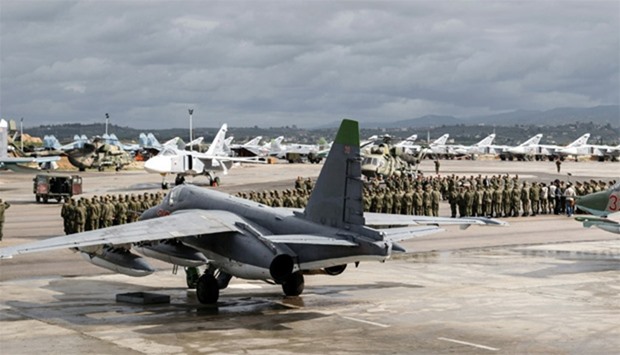SU-25 combat aircraft and IL-76 transport planes pulled out of Russia's Hmeimim base in Syria, the defence ministry said in a statement.
The departure follows that of a first group of aircraft which arrived back in Russia on Tuesday to a hero's welcome.
Washington said Tuesday that ‘the earliest indications are that the Russians are following through’ on the surprise withdrawal.
The pullout has spurred hopes for peace talks in Geneva aimed at ending Syria's brutal five-year conflict, which has killed more than 270,000 people and displaced millions.
UN envoy Staffan de Mistura described the withdrawal as a ‘significant development’ for the talks, after the regime and rebel delegations submitted roadmaps for a political solution.
‘We hope (this) will have a positive impact on the progress of the negotiations,’ he said.
Kerry said Tuesday he would hold talks with Russian President Vladimir Putin to ‘try to take advantage of this moment,’ which he described as the best opportunity in years to end the bloodshed.
He is expected to go to Moscow some time next week after a trip to Cuba.
‘As we mark the fifth anniversary of the start of this horrific war, we may face the best opportunity that we've had in years to end it,’ he said.
- 'Terrorist targets' -
In a shock move, Putin ordered the ‘main part’ of Russia's forces out of Syria on Monday, but pledged to keep some air and naval bases in the war-torn nation.
A senior official said strikes would also continue against ‘terrorist targets’, and a monitoring group said Russian aircraft had struck the Islamic State group around the ancient city of Palmyra.
The first of Russia's warplanes to leave Syria received a hero's welcome at an airbase outside the city of Voronezh, where they were greeted by a ceremonial flypast and dozens of cheering supporters.
Pilots were tossed in the air as they disembarked, before being given a traditional present of a loaf of bread and salt, while a robed Orthodox priest offered them an icon to kiss.
Some governments expressed hope the Russian move could pressure its long-time ally Syrian President Bashar al-Assad to negotiate -- although the Kremlin has denied that was its intention.
Germany's foreign minister said a Russian withdrawal ‘increases the pressure’ on Assad to negotiate, while France added: ‘Anything that helps towards a de-escalation in Syria should be encouraged.’
The Syrian president's fate remains a key sticking point in the Geneva talks, which are also looking at how to form a new government, a fresh constitution and hold elections within 18 months.
De Mistura said both sides had submitted their views on how to move forward, and he would try to ‘analyse’ their positions to find any possible common ground.
‘We... exchanged some papers but also ideas on how to get deeper at the next meeting on the issue of transitional processes,’ the envoy said after the second day of negotiations.
If there was progress, Syria's main opposition group told AFP Tuesday it would be ready to negotiate in the same room with the regime instead of via a mediator.
- Russia bombs Palmyra -
Delegates at the talks held a moment of silence on Tuesday to mark the fifth anniversary of the beginning of Syria's civil war, which has seen more than four million people flee the country.
The UN's refugee commissioner Filippo Grandi said he would ask the international community to take in another 400,000 Syrian refugees as the country's neighbours struggle to cope with the exodus.
Fighting has eased since a temporary ceasefire began on February 27, despite accusations of some violations, though clashes have continued with jihadist groups not covered by the truce.
A commander told AFP that Al-Qaeda's Syrian affiliate Al-Nusra Front was preparing to launch a new offensive ‘within the next 48 hours’ to recapture territory from the regime.
‘The Russians withdrew for one reason,’ he said, speaking on condition of anonymity.
‘(Russia) will not make any more sacrifices for a regime that has basically collapsed.’

